Poached Turkey Breast with Gravy
November 19, 2012 | Updated August 17, 2021
As an Amazon Associate I earn from qualifying purchases.
Holly and I often have quiet Thanksgivings. Many times we wake up early, head out to hunt for a little while, then kick back with some football and an easy dinner. Roasting a whole turkey, especially a wild one, is not what I call an easy dinner.
But you gotta have turkey with gravy on Thanksgiving, right? True enough, but who says you have to have the whole turkey? Poached turkey breast is the answer.
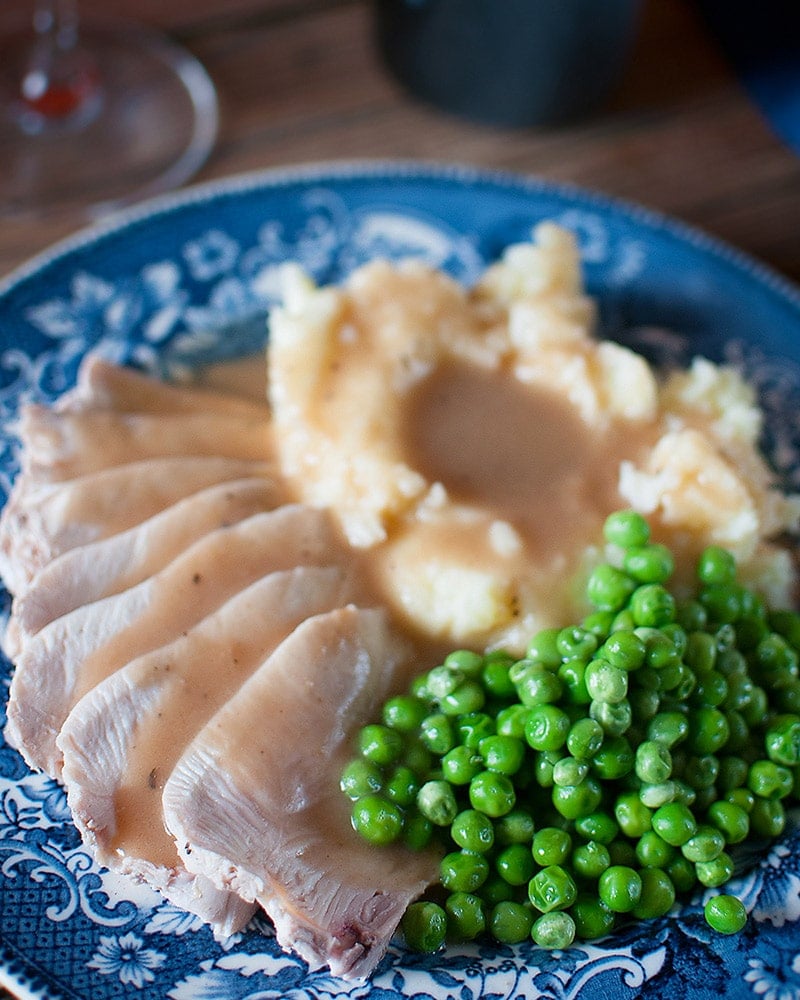
Poached turkey breast is an easy way to have a lovely Thanksgiving for a couple or small family. I am using wild turkey here but any sort of turkey you can find will work.
If you want to go the extra mile, you’ll need a couple turkey wings (skinned or plucked) to make some broth (and to help the gravy), but you can use store-bought chicken broth instead. We like to use a full turkey breast, which runs about 2 1/2 pounds, but you can cut it in half if it’s just the two of you.
What makes this different from everyone else’s “simple Thanksgiving menu” is the way I cook the turkey and the gravy.
You start with the gravy, which hinges on sherry and those roasted turkey wings that are turned into a simple broth — but again, like I said, you can use regular chicken broth instead. But you need enough broth so you can poach the turkey breast very gently.
Poaching keeps the meat super moist, and is infinitely better for a piece of skinless breast than roasting or pan-frying. Finish it off with some wild mushroom stuffing or simple mashed potatoes and a vegetable of your choice and there you have it: Traditional, with a bit of modern technique.
Even if you skip the Thanksgiving gravy and side dishes, I urge you try poached turkey breast: It is so much juicier and really lends itself to whatever gravy or sauce you feel like using that day. Other great options are Southern red eye gravy, and maple bourbon gravy.
Poached Turkey Breast with Turkey Gravy
Ingredients
OPTIONAL WING BROTH
- 2 turkey wings (both drumette and second digit)
- 1 tablespoon vegetable oil
- Salt
- 2 quarts water
- 2 bay leaves
- 1 tablespoon cracked black peppercorns
- 1 teaspoon dried thyme
- 1 teaspoon dried sage, or 1 tablespoon chopped fresh sage
- 1 cup chopped onion
- 1/2 cup chopped carrot
- 1/2 cup chopped celery
GRAVY
- 3 tablespoons butter
- 3 tablespoons flour
- 1/2 cup sherry or Madeira
- 1 to 1 1/4 cup turkey wing broth
- 1 tablespoon Worcestershire sauce
- Salt and black pepper to taste
TURKEY
- 1 1/2 to 2 1/2 pounds skinless turkey breast
Instructions
- If you are making the broth, preheat the oven to 425°F. Coat the turkey wings in the vegetable oil and salt well. Roast in a cast iron frying pan or other oven-proof pan until nicely browned, from 45 minutes to an hour. Put the roasted wings in a pot with all the other ingredients for the broth and bring to a simmer. Simmer gently until the meat wants to fall off the bones. This will take about 90 minutes with a domesticated turkey, longer for wild. You can pick off the meat and eat it later, or you can chop it up and put some in the gravy, too.
- Once you have the broth made, take the turkey breast out and salt it well. Let it sit on a cutting board for 30 minutes or so to come to room temperature.
- Bring the broth to a simmer and drop the turkey breast in. The turkey should be submerged by the broth. If it is not, add water or chicken stock. Once the turkey is in the broth, move the pot to your weakest burner and turn the heat to its lowest setting. Cover the pot and let it steep in the hot broth for at least 30 minutes, and up to 1 hour if you are using a full half breast. Remember to never let the water simmer! You are looking for a target temperature of 155°F to 165°F. So long as you are in that ballpark, you will not overcook the turkey.
- Make the gravy while the turkey is poaching. Heat the butter in a small pot over medium-high heat. When it's hot, add the flour and mix well. Cook this, stirring often, until it smells nutty and turns milk-chocolate brown, about 10 minutes. Stir in the sherry. The mixture will seize up, so slowly stir in 1 cup of the hot broth until the gravy has the consistency of melted ice cream. Add salt, black pepper and Worcestershire sauce to taste. Turn the heat to low and stir from time to time. If it gets too thick, add a little more broth.
- To check if the turkey has cooked all the way through, either test it with a meat thermometer -- you want it to read 150°F -- or slice the thickest part and look: You want a blush of pink in the meat. Slice and serve with mashed potatoes and a vegetable of your choice. Ladle over lots of gravy!
Nutrition
Nutrition information is automatically calculated, so should only be used as an approximation.
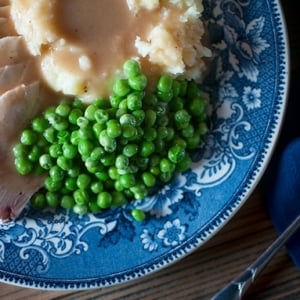
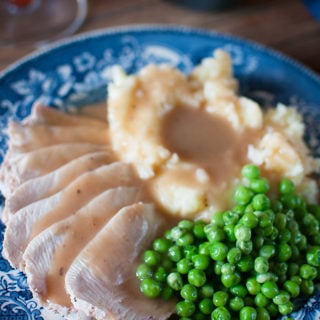
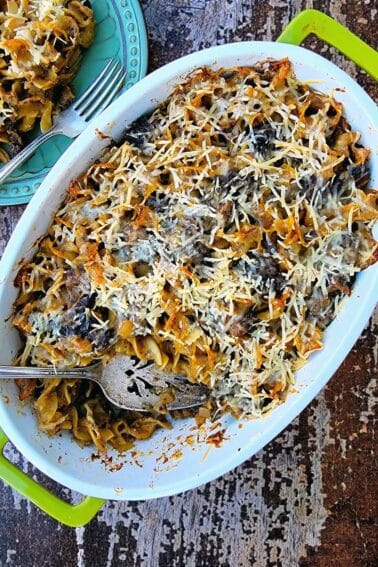
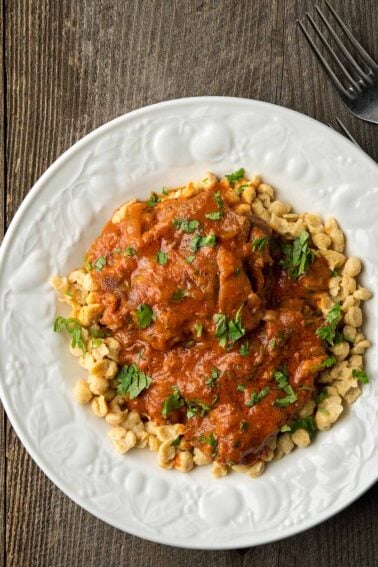
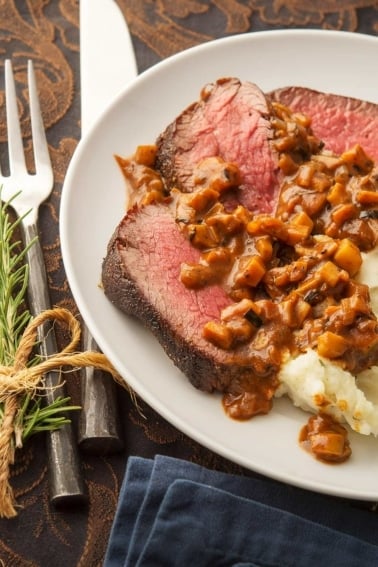
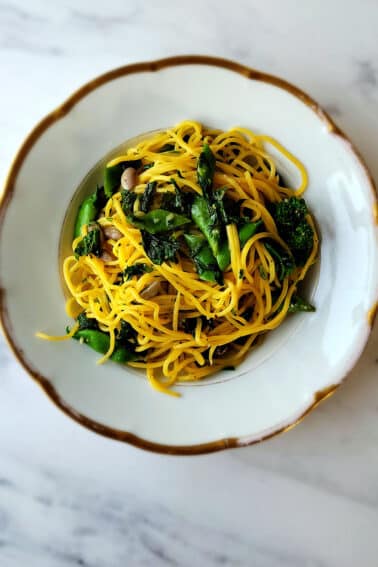
Hank, my wife is allergic to sherry, Madeira, port.. Could I leave that out or is there a substitute? She can drink red or white wine no problem.
Bendrix: No problem. I’d go for red wine in that case.
I am wondering about the safety of turkey cooked to 150 degrees. Everything I’ve ever read says to cook it to 165. Are you rolling the dice with the lower temperature, or is wild turkey different from domestic birds?
Lisa: Alas, everything you have read is actually wrong. That higher temperature comes from the USDA, which acknowledges that it’s an “idiot proof” temperature not really needed. Only after quite a bit of lobbying did they drop the pork temperature from 165F to 154F. I expect they’ll do the same with turkey and chicken soon. If you want, take the turkey to 155F. It’s not a roll of the dice, as the interior of meat is sterile. Only possible issue is the exterior of the meat, and since you put the turkey into boiling water, that “cauterizes” the exterior, killing any bad microbes.
Finally, you are correct: Wild turkeys do not have the same issues with salmonella, etc., that farmed ones have. They are, and their meat is, much cleaner.
Do you ever roast a whole wild turkey? I’ve done it brined and had good luck. It was very tasty and moist. Just wondered if you had a recipe. Thanks.
Hank,
It’s wild turkey time again. I love your sous vide advice on the breast. It comes out tender and beautiful. Would you add any herbs, butter etc before putting in the sous vide?
Kevin: Butter is always good, as might be thyme, parsley, chervil, a small amount of rosemary, basil…
I made this last night. It was fairly easy to keep the water at a steady temperature using a candy thermometer. The turkey breast and gravy were great!
Thanks for a non-complicated, easy to follow recipe! I’m a novice at this and have only cooked wild turkey two times prior to this recipe. I did overcook by about five degrees but the result was really delicious. I will definitely double the gravy recipe next time, as my husband and I both enjoyed the deliciousness atop the turkey breast. Thanks for being someone I can trust to give me good instructions for delectable results! Now, I’m keeping my fingers crossed that dear husband comes home with another turkey this season!
I’m afraid I used the wrong kind of sage (ground) because the flavor in the finished broth was overwhelming. Should I have used rubbed sage instead?
Thanks Hank. Sorry for all the questions but I am wondering if you have ever used the legs to help make the broth?
Kevin: Because it is only barely attached to the breast. When you cook the breast, it will partially fall off and mess up the cooking process for the breast meat. I always cook the tenders separately.
Thanks, Hank.
What is the purpose of pulling off the “tender”?
Kevin: I’d sous vide the breast at about 150 degrees for a couple hours. Should come out really moist and tender. Be sure to pull off the “tender” from the breast first!
Hank,
Do you cook wild turkey breasts any differently than domestic? I asked since wild Turkey breasts seem so dry. I have a sous vide and should have a wild turkey this weekend.
BTW, I love your Duck, Duck Goose cookbook. Sichuan Fragrant Mallard is killer.
Tried this yesterday. Really good. Thanks for the idea.
Kelly: That is a HUGE turkey breast. You can do one of two things: Cut the breast into a couple pieces so they cook faster, or you can just cook it longer. A 4 pound breast will be pretty thick on the fat end, so if it were me I would cut the breast in two and poach them for at least 1 hour. The good thing about this technique is that if you’re wrong and the breast isn’t cooked, you can cut into it and see — and then return it to the hot water to finish.
So long as you never simmer the water you can leave the turkey in there for hours. Just keep it between 155 and 165 degrees.
I just bought a half a turkey breast at the local market, and it’s nearly four pounds! (1.7kg) I don’t think the Germans slaughter their turkeys young… Anyway, how long do you think it will have to poach? Is there a minutes/pound rule? I really want to do this for our family dinner on Friday, since my father-in-law always says he doesn’t like turkey because it’s too dry. I would like to prove him wrong. 🙂
Steve: Shotgun, 20 gauge, with steel shot. That way I can shoot at any quail, doves, turkeys or ducks that I might find.
Very nice and simple recipe Hank.
Will have to try this on my next turkey.
The first of the season was deep fried.
Talk about time consuming, but delicious.
What a great time of the year.
Turkey, rabit, quail, dove, waterfowl, porcini, chanterelle, dungeness crab, abalone, and more can all be had if adventurous enough.
Great idea and recipe. Especially after last year’s 40 pound turkey debacle. Hope to try this soon.
Off topic: Rabbits in November? I’m curious .22 or shotgun? 12 gauge or 20?
Mark: Ha! I *really* wanted to write this up as a sous vide recipe, but I figured no one would have the equipment. But yes, it is perfect for sous vide. Salt well, smear with butter and sous vide at 150-155 degrees for 1 hour to 90 minutes. I’d go with the 90 minutes to be safe — not like you will overcook anything at that temp…
Would you sous vide if you had the equipment? Or stick with the poach?